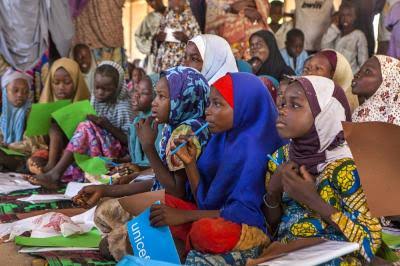Princess Kelechi
The United Nations Children Fund (UNICEF) has disclosed that nearly half of all schools in the North-East region have been targeted by suicide bombers, and suffered one form of attack or the other, in the ongoing insurgency which has lasted more than a decade.
According to a statement on Monday by Folashade Adebayo, UNICEF Communication Officer, Children in north-east Nigeria are among the most conflict-affected and educationally disadvantaged in the world.
The UN agency stated that in Adamawa, Borno and Yobe states alone, 1.9 million conflict-affected boys, girls and adolescents are without access to basic quality education.
“The protracted security crisis in north-east Nigeria has exacerbated the weakness of basic social services delivery depriving children of their right to education, protection, and many other critical services.
“Since 2012, 31 per cent of all schools in north-east Nigeria have been hit, at least once by bullets, shells, or shrapnel. Ten per cent have been deliberately set on fire and 26 per cent targeted by suicide bombers. At 47.3 per cent, almost half of all schools in the region require rehabilitation”, the statement read.
The UNICEF announced that it partnered with the European Union to build the capacity of 50 government education officers in north-east Nigeria to improve the quality of data and evidence available to formulate impactful policies and drive targeted investments in the education sector in the region.
The Agency said the training on Education Management Information System (EMIS) for key partners in Adamawa, Borno and Yobe will lead to the generation of credible data and broader indicators to help education managers and policy makers design interventions that meet the learning needs of all vulnerable children in north-east Nigeria.
“For the first time, data on out-of-school children, children attending Tsangaya and Islamiyya schools and non-formal education pathways will be captured and stored digitally to improve education planning and targeting services to support girls and boys.
“A strengthened EMIS will facilitate efficient information gathering, data analysis and support targeted interventions to address the subsisting gaps in the education sector created by the conflict and other factors,” the agency stated.
Phuong T. Nguyen, UNICEF Chief of Maiduguri Field Office said UNICEF is excited to support Governments in north-east Nigeria to gain timely and credible data to support evidence-based planning for the education sector.
“For conflict-affected children across north-east Nigeria, it means one thing – schools will have adequate teachers, more inclusive and child-friendly learning environment, including safe classrooms, gender-segregated toilets and water points as enablers to stay in school, transition, complete their education and contribute positively to the society. This initiative will help improve access to quality education for marginalised children, especially girls and others living with disabilities,’’ Nguyen said.
Implemented by UNICEF, and the Ministries of Education, State Universal Basic Education Boards, State Agencies for Mass Education and the Ministries of Religious Affairs in the three states, the EU-funded programme is a three-year €10 million European Union Support to Early Recovery and Resilience package to assist children, youths, and communities in north-east Nigeria.
The package also includes the provision of vocational skills and non-formal education to at least 25,000 young people, the construction and rehabilitation of learning centers and the strengthening of education management information systems.

